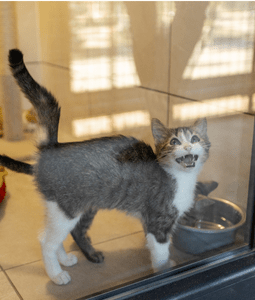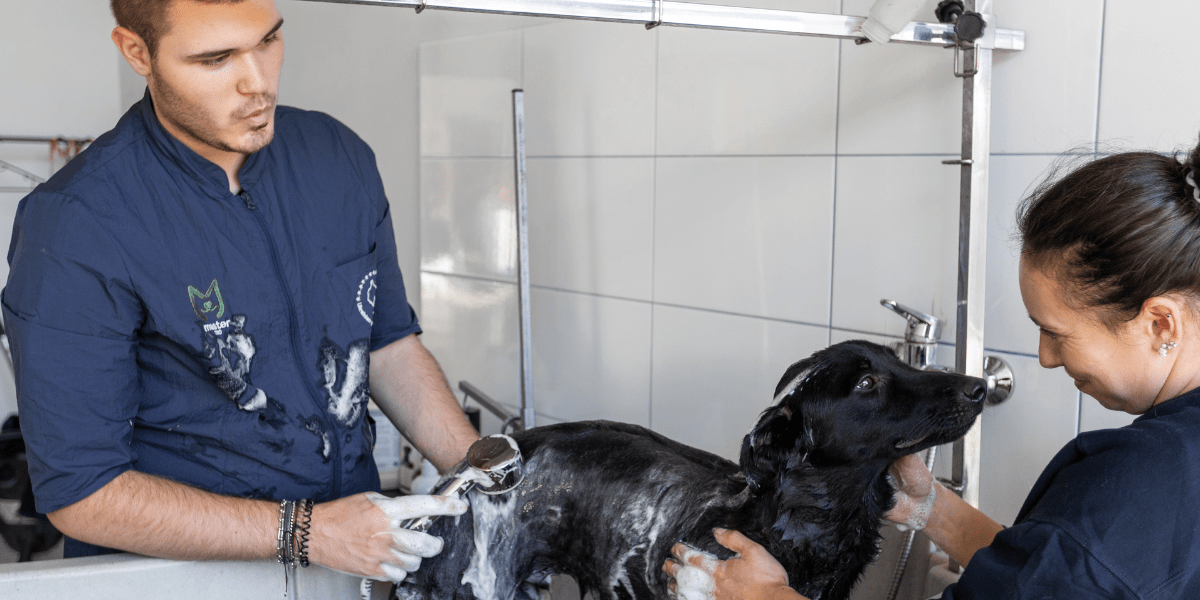One of VWB's incredible on-the-ground partners in Ukraine, The Patron Pet Center, has become a lifeline for animals, particularly those that have been injured and abandoned across frontline areas. From humble beginnings with just a handful of kennels, the Center, based in Kyiv, has grown into one of the country’s most advanced animal welfare facilities. Recently, they recently celebrated the completion of their new cat wing — a state-of-the-art facility providing veterinary care, socialization, and a welcoming space for cats awaiting adoption.
We spoke with Iryna Podvoyska, former director of the Patron Pet Center, to learn how the center has expanded, the challenges of caring for animals from frontline areas, and a vision for the future.
Q: How has the Patron Pet Center expanded since opening?
A: When we first opened, only 14 kennels were under construction — yet more than 100 dogs arrived in the very first month. That’s how our story began. Today, the Center spans two fully equipped floors and provides a safe space for over 300 animals. Our facilities now include:
- A dog quarter with 140 kennels
- Two operating rooms
- A quarantine and housing area for cats
- Unique spaces for human–animal interaction: a coworking space, café, “animal library,” photo studio, and even a gym
Q: What’s new in the upgraded cat area?
A: The cat zone is one of our most ambitious projects, made possible through the support of many partners. It’s not just a shelter — it’s a space for treatment, rehabilitation, and socialization that greatly improves adoption prospects. This makes the cat zone one of the most advanced in Ukraine.
The new facilities feature:
- Quarantine with 51 individual boxes
- Dedicated rooms for FIV- and FeLV-positive cats
- A nursery for mothers with kittens
- A 160 m² enclosure for healthy cats
- An operating room and hydro area
- Visitor-friendly spaces, including a café and coworking area
Q: Has Patron begun building a permanent veterinary clinic on site?
A: At present, we operate with two well-equipped operating rooms. We have essential instruments such as an ultrasound machine, microscope, centrifuge, ophthalmology and otoscopy tools, an ultrasonic scaler, and two surgical tables with hydraulic lifts. But a full-scale veterinary hospital remains our dream. Establishing one is a strategic priority, as it would allow us to expand modern care, lower costs, and improve treatment outcomes.
Q: How have daily operations adapted with more animals arriving from frontline areas?
A: Thanks to careful organization, even frequent evacuations don’t disrupt our daily work. For dogs, we maintain a consistent schedule:
- Morning and evening feeding after walks
- Kennel cleaning during walks
- Regular deep cleanings with volunteer help
Visitors play a vital role too, assisting with walking and socialization — essential steps in preparing animals for adoption.
 PHOTO: Kittens at Patron Pet Center.
PHOTO: Kittens at Patron Pet Center.
 PHOTO: Preparing meals for animals at the shelter.
PHOTO: Preparing meals for animals at the shelter.
 PHOTO: A cat, waiting for adoption, at the Center.
PHOTO: A cat, waiting for adoption, at the Center.
Q: Could you share some of the most impactful rescue stories?
A: Every animal has a story of survival, but a few stand out:
- Zara, who lost both front legs during shelling in Kharkiv. Today, she lives in Berlin with a prosthetist who also supports Ukrainian soldiers.
- Malyuk and Barni, dogs who survived while chained after their home was destroyed. They are now safe and waiting for new families.
- Syoma, once so emaciated he survived on roots and stones. Now he’s the “star of the walks” at our Kyiv center and a beloved pet.
These stories remind us why this work matters.
Q: How has the adoption process evolved?
A: Currently, about 60% of our animals find families abroad — mainly in Germany, Poland, and other EU countries. We stay connected with adopters, offering consultations and support. This helps build trust and ensures animals find responsible, long-term homes.
Q: What are Patron’s goals for the coming year?
A: Our main priorities are:
- Expanding medical facilities and establishing a permanent veterinary clinic
- Developing rehabilitation programs for veterans with the help of service dogs
- Launching educational projects for children and families
- Strengthening international partnerships
Q: How do these upgrades reflect wider trends in Ukrainian animal welfare during wartime?
A: We’re seeing a profound shift: shelters are moving from providing basic survival to offering comprehensive care — medical treatment, rehabilitation, socialization, and education. More organizations now look to Patron Pet Center as a model. We actively consult with other shelters and share best practices. Ultimately, our goal is to nurture a culture of responsibility and compassion — one that will endure long after Ukraine’s victory.
The Patron Pet Center is not just a shelter. It’s a vision of what animal welfare in Ukraine can become: resilient, compassionate, and deeply connected to the healing of communities.
Interested in supporting VWB's on-the-ground partners in Ukraine?





